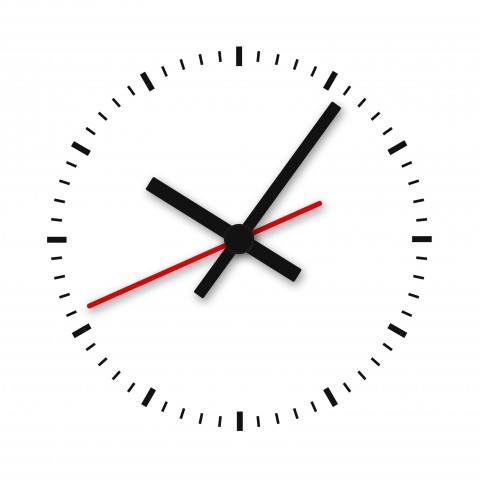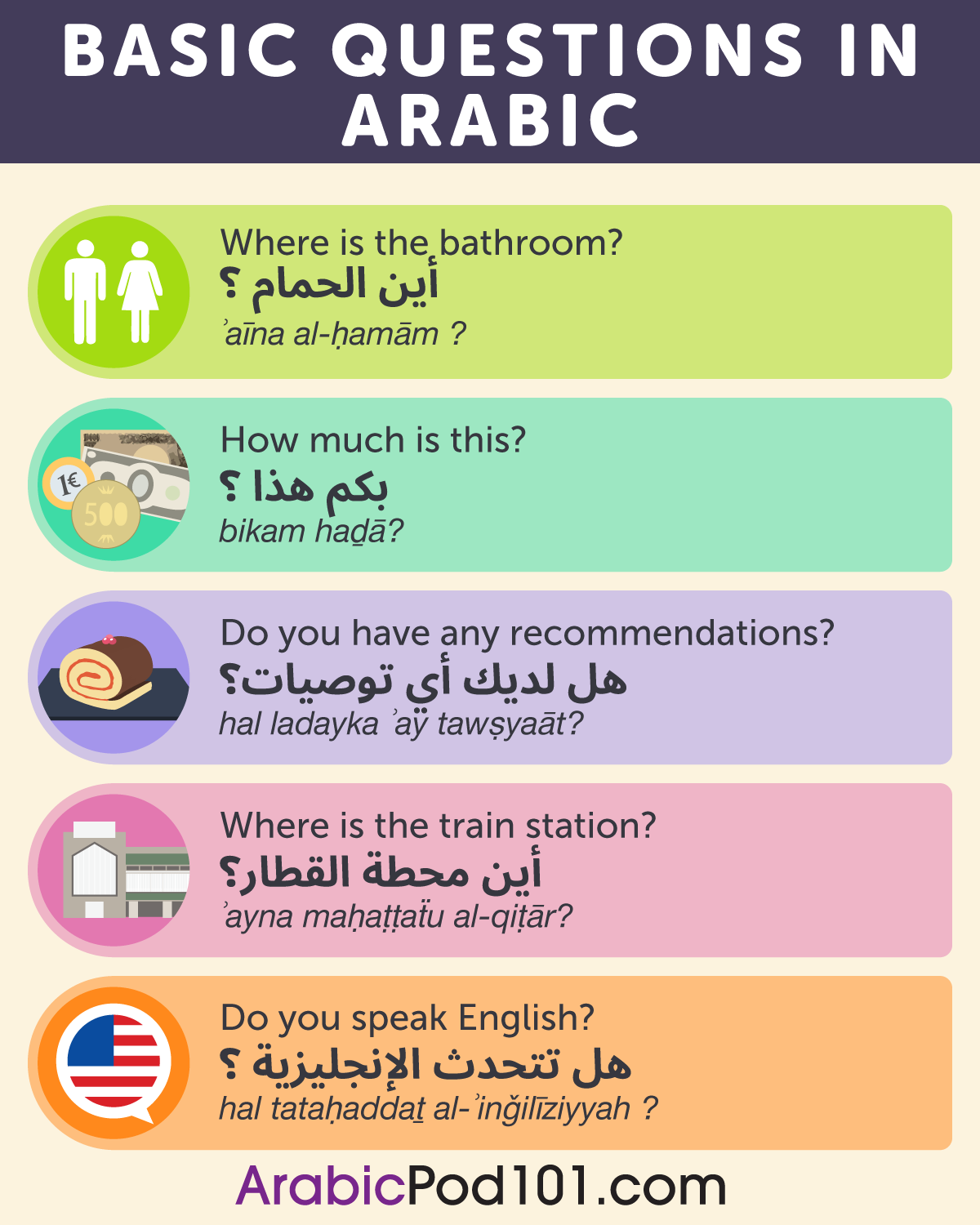
Are you planning a trip to an Arabic-speaking country?
When do you leave?
And how do you say that in Arabic?
Yup, you’ll need to know about telling time in Arabic to get around very well and be on time.
You wouldn’t believe how many tourists get confused and frustrated at bus stations, taxi stands, airports, and train terminals all over the world simply because they don’t understand how to talk about time in the local language.
That’s pretty surprising, to be honest, because you’d think that time words would be one of the things you would prioritize in a new language.
But it still always just seems like something to learn later—until your taxi driver is laughing at you because you misheard what time the bus leaves, and now you’re four hours too late for the last bus out of town.
Been there.
So that’s why we’ve put together this article. It includes everything you need to know about asking for the time in Arabic, plus some interesting things you might not have considered before. Also keep in mind that we have an article about how to talk about dates in Arabic—another important topic you’ll want to know for your trip.
Let’s go!
 Table of Contents
Table of Contents
- Asking for the Time
- Talking about Hours
- Talking about Minutes and Seconds
- Throughout the Day
- Time Zones
- Expressions and Phrases about Time
- Conclusion
1. Asking for the Time

We don’t have a lot of different ways to ask for the time in English, and in Arabic the same principle holds true. Here are some of the most common phrases for asking about time in Arabic:
- كَم الساعَة؟
kam al-sāʿah?
You’re literally asking “How much hour?” This is important, because in Arabic, the question word kam is used to ask for prices:
- كَم الساعَة؟
kam al-sāʿah?
How much is the watch?
Pretty similar, right?
Fortunately, this doesn’t cause a whole lot of confusion. Imagine you’re sitting with a friend and chatting, and it’s getting a little late. If you ask him for the time, he’s not going to think you’re asking about his accessories out of the blue!
To be a little more clear with your words, though, you could also ask:
- كَم الساعَةُ الآن؟
kam al-sāʿaẗu al-ʾān?
What time is it now?
Al-aan, meaning “now,” is just to eliminate any chance of confusion.
To be a little more polite when asking a stranger, try out this phrase as well:
- الساعَةُ كَم مَعَك؟
al-sāʿaẗu kam maʿak?
The word for “when” in Arabic is mata, but it works just like in English.
- مَتى سَتَتَخَرَّجُ في الجامِعَة؟
matā satataḫarraǧu fī al-ǧāmiʿah?
When will you graduate from university?
You can also ask specifically for “what time” certain things are going to happen. This sentence pattern follows the same logic as the others, so we don’t need to see a ton of examples.
- مَتى يُغلِق هَذا المَتجَر؟
matā yuġliq haḏā al-matǧar?
What time does the store close?
2. Talking about Hours

One big difference between talking about the time in Arabic as opposed to other languages is that in Arabic, the ordinal numbers are used to count the hours.
That means you’re literally counting the hours—saying the equivalent of “first hour,” “second hour,” “third hour,” and so on.
Talking about time is one really great way to practice your ordinal numbers. If you’ve forgotten what they look like, here they are now:
| English | Arabic | Romanization |
|---|---|---|
| one o’clock | الساعَة الوَاحِدَة | al-sāʿah al-waḥidah |
| two o’clock | الساعَة الثانِيَة | al-sāʿah al-ṯāniyah |
| three o’clock | الساعَة الثالِثَة | al-sāʿah al-ṯaliṯah |
| four o’clock | الساعَة الرابِعَة | al-sāʿah al-rābiʿah |
| five o’clock | الساعَة الخامِسَة | al-sāʿah al-ḫāmisah |
| six o’clock | الساعَة السادِسَة | al-sāʿah al-sādisah |
| seven o’clock | الساعَة السابِعَة | al-sāʿah al-sābiʿah |
| eight o’clock | الساعَة الثامِنَة | al-sāʿah al-ṯāminah |
| nine o’clock | الساعَة التاسِعَة | al-sāʿah al-tāsiʿah |
| ten o’clock | الساعَة العاشِرَة | al-sāʿah al-ʿāširah |
| eleven o’clock | الساعَة الحادِيَةَ عَشَرَة | al-sāʿah al-ḥādiyaẗa ʿašarah |
| twelve o’clock | الساعَة الثانِيَةَ عَشَرَة | al-sāʿah al-ṯāniyata ʿašarah |
Different Arab countries use the twelve-hour clock or the twenty-four-hour clock. For example, Algeria, Tunisia, and Morocco use the twenty-four-hour clock, while Egypt, Saudi Arabia, and Qatar use the twelve-hour clock.
Therefore, when saying the time in Arabic, you’ll need to know these words as well:
- a.m. — صَباحاً (ṣabāḥan)
- p.m. — مَسائاً (masāʾan)
And now some question and answer phrases to help you internalize these patterns:
- A: كَم الساعَة؟
A: kam al-sāʿah?
A: What time is it?
B: إنَّها الثانِيَةَ عَشَرَة.
B: ʾinnahā al-ṯāniyaẗa ʿašarah.
B: It’s twelve o’clock.
- A: عُذراً, هَل مَعَكَ ساعَة؟
A: ʿuḏran, hal maʿaka sāʿah?
A: Excuse me, do you have a watch?
B: أَجَل، إنَّها الساعَة الثالِثَةَ مَسائاً
B: aǧal, ʾinnahā al-sāʿah al-ṯaliṯaẗa masāʾan.
B: Yes, it’s three o’clock p.m.
- A: هَل الساعَة الخامِسَة؟
A: hal al-sāʿah al-ḫāmisah?
A: Is it five o’clock yet?
B: لا، إنَّها لازالَت الساعَة الرابِعَة.
B: lā, ʾinnahā lāzal-at al-sāʿah al-rābiʿah.
B: No, it’s only four o’clock.
3. Talking about Minutes and Seconds

When discussing minutes after the hour, we use the ordinal time as well. More occasions to practice your Arabic numbers!
- إنَّها الثالِثَة و خَمس وعِشرونَ دَقيقَة.
ʾinnahā al-ṯaliṯah wa ḫams wa ʿišrūna daqīqah.
It’s three twenty-five.
However, there are some intricacies—and yes, shortcuts too—that make telling time in Arabic an exciting intellectual challenge.
For the first minute after the hour, English speakers just read out the digits: 5:01 becomes “five oh one.” In Arabic, though, the equivalent is “hour fifth minute.” “Minute” in Arabic is daqiiqah.
- إنَّها الخامِسَة و دَقيقَة.
ʾinnahā al-ḫāmisah wa daqīqah.
It’s 5:01.
Arabic has a handy grammatical feature called the “dual,” which counts exactly two of something. So when we say “five oh two,” we don’t need to specify the number either. Using the dual form of “minute” is a way to say that explicitly.
- إنَّها الخامِسَة و دَقيقَتان.
ʾinnahā al-ḫāmisah wa daqīqatān.
It’s 5:02.
After that, it follows the natural pattern that you might expect.
- الآن الساعَة السادِسَة و تِسع و ثَلاثونَ دَقيقَة.
al-ʾān al-sāʿah al-sādisah wa tisʿ wa ṯalāṯūna daqīqah.
Right now it’s 6:39.
Of course, not everybody is as exact when telling the time in Arabic as to say the precise minute. Many people may respond more vaguely, so these are also some phrases you should know.
- الساعَة حَوَالَيْ الثانِيَة و ثَلاثونَ دَقيقَة.
al-sāʿah ḥawalay al-ṯāniyah wa ṯalāṯūna daqīqah.
It’s about two-thirty.
In many languages, you can express the time as an hour plus or even minus a certain fraction. Arabic is no exception. The most commonly used fractions are “quarter,” “half,” and “third.”
- سِأِراكِ غِداً عِندَ السادِسَة و النِصف.
siʾirāki ġidan ʿinda al-sādisah wa al-niṣf.
I’ll see you tomorrow at half past six.
- أُريدُ أَن أَحجُز طاوِلَة لِلساعَة الوَاحِدَة و الرُبع.
ʾurīdu ʾan ʾaḥǧuz ṭāwilah lilsāʿah al-waḥidah wa al-rubʿ.
I want to reserve a table for a quarter past one.
When we want to express the time until the next hour (“ten minutes to two”) we use the word illa.
- إنَّها الخامِسَة إلّا عِشرونَ دَقيقَة.
ʾinnahā al-ḫāmisah ʾillā ʿišrūna daqīqah.
It’s twenty minutes to five. (Literally: Five short twenty minutes.)
Colloquial dialects use cardinal numbers for the hours and minutes, so they’ll be a little different from the numbers listed above, but not too different.
So if you’re pressed for time and going to speak a particular Arabic dialect, simply learn the numbers and the words for half and quarter, and you’re pretty much all set!
4. Throughout the Day

There are several words to describe the general time of day in Arabic. However, the underlying culture of these words may be rather different than what you’ve gotten used to in your own language.
A “day” in Arabic is a nahaar. This refers to “daytime,” basically the hours that the sun is in the sky providing light. The opposite of that is lail, which means “nighttime,” or the hours between the sun dipping below the horizon and coming back up again.
In English, we tend to divide the day into a morning, an afternoon, an evening, and a night. In Arabic, there are five words for this.
Ṣabāḥ is the word for morning, when the sun is rising and the day is new. Around eleven o’clock the day turns into ẓuhr, or “noontime.” That refers to exactly twelve o’clock noon in English, but in Arabic it’s a looser concept, covering about four hours from 11:00 to 15:00.
Next is, logically, afternoon, or baʿd al-ẓuhr. Again, we’re talking about a roughly four-hour period here when the sun is beginning to get a little lower in the sky, and people are generally finishing up their work day.
Finally is masā’. This refers to the evening, when shadows get longer and people have dinner or go out for walks in the cooler air.
Let’s look at some examples of phrases that we can use in conjunction with these words.
- هَل تُريد المَشي مَعي هَذا المَساء؟
hal turīd al-mašī maʿī haḏā al-masāʾ?
Do you want to walk with me this evening?
- لَدَيَّ إجتِماعَيْن غَداً مَسائاً.
ladayya ʾiǧtimāʿayn ġadan masāʾan.
I have two meetings tomorrow afternoon.
- إلى اللَقاء! أَراكَ غَداً صَباحاً!
ʾilā al-laqāʾ! ʾarāka ġadan ṣabāḥan!
Goodbye! I’ll see you tomorrow morning!
5. Time Zones

The Middle East is big, real big. And in other places where people often study Arabic, like in Southeast Asia or India, there’s even more geographical diversity.
For that reason, we have to deal with time zones. The common Arabic word for “time zone” is تَوقيت.
The Middle East as a geographic entity spans four time zones from UTC+2 to UTC+4, and North Africa also includes UTC+0 and UTC+1. As a point of interest, Iran—though not an Arabic-speaking country—sets its time zone a half-hour off from neighboring Iraq and UAE.
If you’re doing a tour of several Arabic-speaking countries, you should of course be aware of these differences and perhaps even become acquainted with these helpful phrases:
- هَل الجَزائِر في نَفس تَوْقيت مِصر؟
hal al-ǧazāʾir fī nafs tawqīt miṣr?
Is Algeria in the same time zone as Egypt?
- الإمارات تَسبِق قَطَر بِساعَة.
al-ʾimārāt tasbiq qaṭar bisāʿah.
UAE is one hour ahead of Qatar.
- كَم الساعَة في الرِيَاض الآن؟
kam al-sāʿah fī al-riyaḍ al-ʾān?
What’s the time in Riyadh right now?
6. Expressions and Phrases about Time

When you talk about time, you don’t always talk about the numbers on the clock. In fact, look at that previous sentence—”always” is a time word!
To really get a native-like flow to your speech, you have to be aware of the different phrases you can use to add time-related detail to whatever you’re saying.
We’ve put these into the context of simple sentences so that you can see how the concepts are expressed in Arabic. You’ll find out pretty soon that not everything translates directly between Arabic and English!
الآن (al-ʾān) — Now
أَنا مُستَعِدٌ الآن.
ʾanā mustaʿidun al-ʾān.
I’m ready now.
لاحِقاً (lāḥiqan) — Later
أُريدُ أَن أَبدَأ الإجتِماع لاحِقاً.
ʾurīdu ʾan ʾabdaʾ al-ʾiǧtimāʿ lāḥiqan.
I want to start the meeting later.
قَريباً (qarīban) — Soon
قَريباً سَتَفهَم العَرَبِيَّة بِشَكلٍ مُمتاز.
qarīban satafham al-ʿarabiyyah bišaklin mumtāz.
Soon you’ll understand Arabic perfectly.
In time, over time, out of time—it seems like you can make phrases out of any preposition in English! But notice, though, that in Arabic things are often worded differently.
في الوَقت المُحَدَّد (fī al-waqt al-muḥaddad) — On time
لَم يَبدَأ المَشروع في الوَقت المُحَدَّد.
lam yabdaʾ al-mašrūʿ fī al-waqt al-muḥaddad.
He didn’t start the project on time.
مُتَأَخِّرون (mutaʾaḫḫirūn) — Out of time
نَحنُ مُتَأَخِّرون! يَجِب أَن نَذهَب!
naḥnu mutaʾaḫḫirūn! yaǧib ʾan naḏhab!
We’re out of time! We have to go!
في الوَقت المُحَدَّد (fī al-waqt al-muḥaddad) — In time
لَقَد وَصَلَت إلى المَحَطَّة في الوَقت المُحَدَّد لِقِطارِها.
laqad waṣalat ʾilā al-maḥaṭṭah fī al-waqt al-muḥaddad liqiṭārihā.
She arrived at the station in time for her train.
مَع الوَقت (maʿ al-waqt) — Over time
تَعَلُّم العَرَبِيَّة عَمَلِيَّة تَحدُث بِبُطء مَع مُرور الوَقت.
taʿallum al-ʿarabiyyah ʿamaliyyah taḥduṯ bibuṭʾ maʿ murūr al-waqt.
Learning Arabic is a process that happens slowly over time.
7. Conclusion

What you’ve just read in this article (especially if you followed all the links) is going to cover virtually every situation you’ll have when talking about time in Arabic.
Yes, the word order and the bit about ordinal/cardinal numbers is probably pretty different from what you’re used to. But it’s really not objectively harder or easier than English.
And the best part about learning to tell time in another language is that you get opportunities for practice literally every day.
Ask someone what the time is and they’ll tell you. Then ask somebody else, and they’ll tell you too. It’s the least-stressful conversation possible!
When you think of it that way, there’s no time to lose!
In fact, why not practice giving the time in Arabic right now? Drop us a comment with the current time in Arabic below!
Happy Arabic learning!










